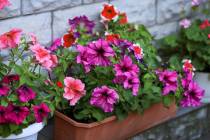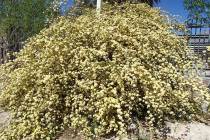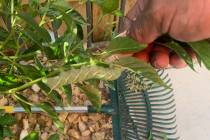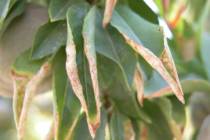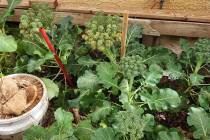Green thumbs start young in Junior Master Gardener program



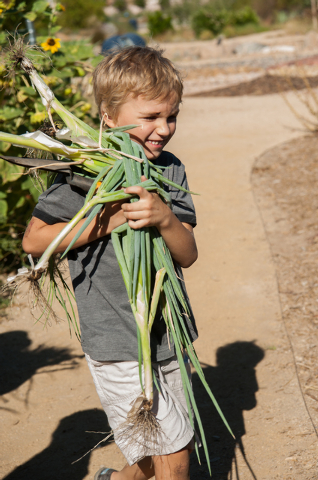
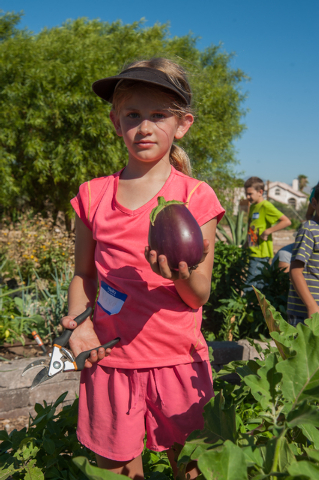
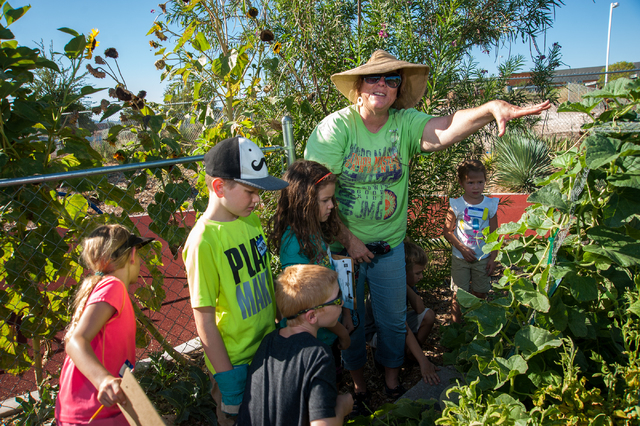
Fifteen children gather in the garden at the University of Nevada Cooperative Extension Lifelong Learning Center, 8050 Paradise Road.
They pick peppers, pull green onions and prune eggplants. At the sound of a barking dog alarm, they race to a bench for a water break.
“We try to plant one thing and harvest another each week,” said Junior Master Gardener program coordinator Karyn Johnson. “We have peanuts, cantaloupes, tomatoes, herbs. We have quite a variety of things growing.”
The University of Nevada Cooperative Extension plans open houses for its Junior Master Gardener program from 10 a.m. to 2 p.m. Aug. 9 at the center and Aug. 16 at the Research Center & Demonstration Orchard, 4600 Horse Drive.
The biweekly classes are set to start Sept. 13 and Sept. 6, respectively.
“Junior Master Gardener is a service learning-based program for ages 7 to 12,” Johnson said. “The kids spend half the time in the garden planting and harvesting and half the time in the classroom doing garden-related educational activities.”
The children are set to learn about planting and harvesting food, bugs and insects, commercial and organic gardens, the environment and more.
“After harvesting the food, the children get to taste and eat the food they grow,” Johnson said. “Any food we don’t eat gets donated to local charities, so they also learn about giving to the community and not just taking from it.”
To become a certified Junior Master Gardener, children must complete a handbook and community service over four semesters. Each semester contains eight classes and covers two chapters.
“Some schools require community service, so we help with that, too,” Johnson said. “Parents and siblings are also welcome to work in the garden during the time the children are in the program.”
North Las Vegas resident Foster Creque, 9, joined the program about two years ago when his mother, Erica, discovered it while working as a school teacher.
“I thought it would be interesting for him to meet people outside of school and just give him a different experience,” Erica Creque said. “It encourages kids to try things they might not otherwise try. It broadens their perspective and encourages them to make healthy choices.”
Foster attends Sandy Miller Elementary School, 4851 E. Lake Mead Blvd., and plans to use his knowledge to help his classmates in the school’s garden.
“Kids need to know that they don’t artificially make food at the store,” Foster said. “Vegetables like potatoes and carrots are a lot of work to harvest because they’re in the ground. A lot of labor goes into them.”
Sophia Bergeron, 12, began gardening with her parents when she was younger and was introduced to the program through a homeschooling group.
“I already loved gardening, so I just wanted to start getting more involved,” she said. “It was definitely fun, and I learned a ton. The program was a lot more detailed than what I ever learned from reading books.”
The North Las Vegas resident plans to continue volunteering until she can transition into the Master Gardener program when she turns 14.
“I love volunteering and interacting with the other kids and learning about gardening,” Sophia said. “I will definitely be involved with Master Gardener all my life.”
The program accommodates up to 20 children and costs $52 per semester. Discounts are available for multiple siblings or children from disadvantaged families.
For more information or to register, visit jmgkids.us or call Johnson at 702-257-5523.
Contact Henderson View reporter Caitlyn Belcher at cbelcher@viewnews.com or 702-383-0403.












